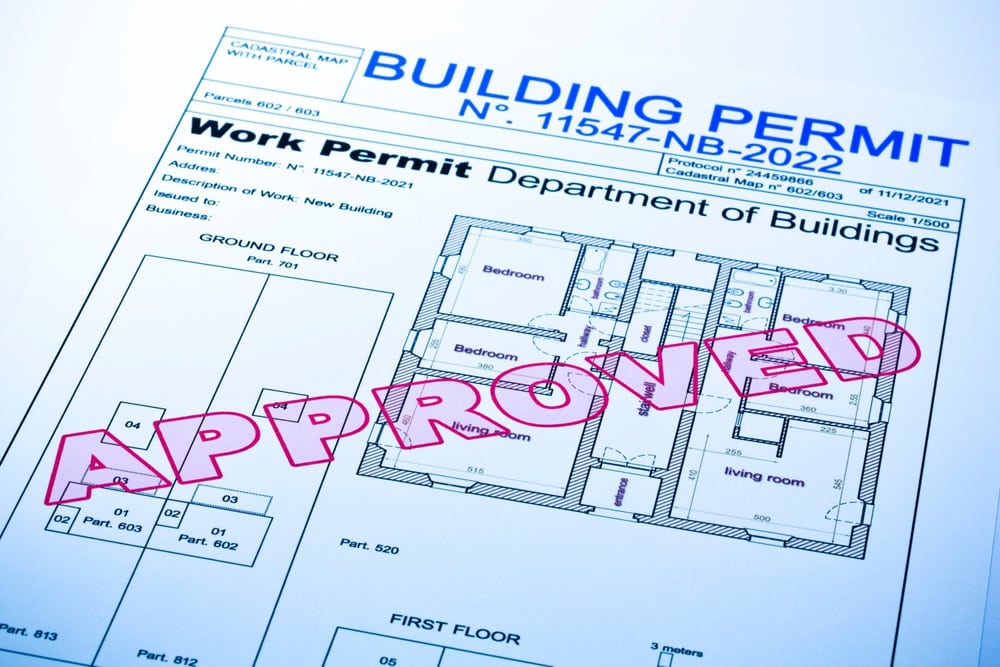You could be just getting started with your career in construction or you could be a seasoned pro – but your knowledge of building permits, codes, and regulations should always continue to grow.
As you do more work, you’ll naturally become familiar with your local laws, but it’s also critical that you know some of the basics in a general sense.
Today, we’ll start with permits! Yeah, we’re excited, too.
These permits will no doubt come up again and again as you work. It may be a good idea to bookmark this page as a reference to make sure all your construction projects are safe and in accordance with local regulations.
Building Permits
- Do I need a building permit for my project? A quick review of the California Building Standards Code will remind you that you cannot erect, construct, enlarge, alter, repair, move, improve, remove, convert, or demolish any building without a building permit.
- The California Department of Housing and Community Development website could come in handy if you ever need to apply for a building permit online.
Electrical Permit
- You’ll need an electrical permit anytime you install, alter, repair, replace, or remodel an electrical system. There are a few cases that are exempted by the California Electric Code or by a County Ordinance, but it is safe to assume you’ll need this permit in most cases.
- When in doubt, check local guidelines for electrical service upgrades and related contractor work.
Plumbing Permit
- While there are so many different kinds of plumbing services for general contractors to be aware of, any sizable plumbing project or plumbing repair will require a plumbing permit.
- The Uniform Plumbing Code and local regulations will help you install, repair, and replace plumbing fixtures and piping safely and legally, but make sure you are familiar with your local regulations.
Mechanical Permit
- This permit works hand-in-hand with other permits for certain construction projects. You’ll need a mechanical permit before doing any ductwork or heating or cooling work.
- Permit advisors – like Permit Advisors – can help you plan your project according to local building and safety standards.
Grading Permit
- If any of your construction work involves changing the topography of a property, perhaps cutting or filling space in the earth, you’ll need a grading permit.
- Class C-27 license-covered landscaping work will often require grading permits. Think about all the hillside construction, flood zone mitigation, and seismic hazard zone mitigation you see happening in California. That’s all grading.
Demolition Permit
- While it’s true that different jurisdictions have supplemental regulations for the demolition category of construction work, overall you can be sure that you’ll need special permission before tearing down a structure or performing any kind of deep excavation.
- According to the Department of Industrial Relations, you’ll also need to notify utility companies before demolition so they can accommodate the work by either shutting off or rearranging utility services to protect them from damage.
Environmental Permit
- The state of California is sincerely invested in environmental conservation efforts, so wherever your construction projects risk affecting water quality, air quality, protected species, and their habitats, your work will involve environmental permits.
- The California Department of Fish and Wildlife is a great resource for keeping up with the latest environmental reviews and permitting, and this Environmental Permitting Guide might also help you out as well.
Zoning Permit
- Local zoning regulations dictate how land can be used and which kinds of structures can exist where. It sounds simple, but it can get pretty complicated, especially when you look back at our post about mixed-use construction and the zoning problems involved.
- Check with your local planning department and review the standards laid out by the California Department of Housing and Community Development to stay informed about land-use rules you might need to know.
Special Use Permit
- If a construction project involves a temporary structure, a special event, or some kind of unusual land use, that’s where special use permits may come up.
- These permits exist for the sake of flexibility when certain plans come up within certain zoning districts. You can apply for a special use permit in California right here.
Fire Department Permit
- Depending on a construction project’s size or scope, permits and clearances from your local fire marshal might be necessary. If you’re a C-16 licensed Fire Protection Contractor you know these permits well.
- Local fire safety measures will keep you, your team, and your clients safe throughout construction. If you do not obtain the necessary permits, you could be looking at some big fines, major delays, or even a full work stoppage.
In Summary
Of course, there are many more permits you’ll come across throughout your contractor days, but the permits listed above are the ones that will come up repeatedly.
The Contractors State License Board will have all of the information you need when it comes to construction permits in California. Check there and also check with the local governing bodies responsible for the area where you work as regulations and permit requirements will vary depending on your location.

